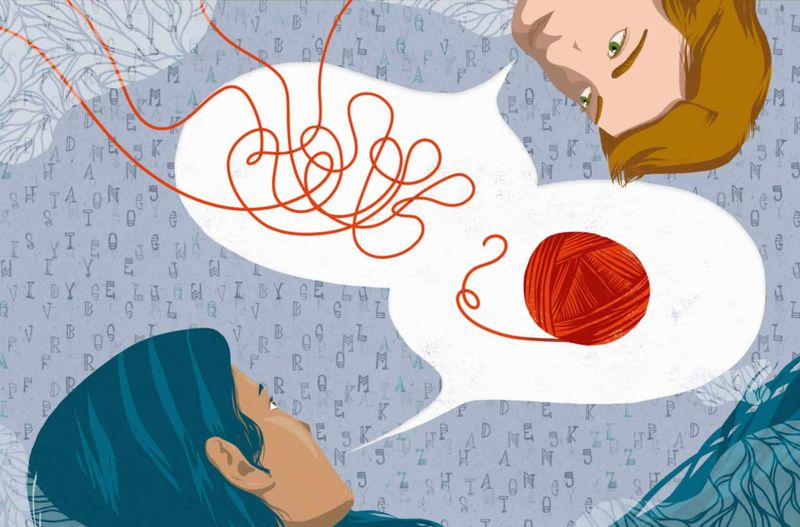18 Types Of Trust Issues That Damage A Relationship
Trust issues in relationships are detrimental to emotional bonds, often leading to misunderstandings and conflicts. Recognizing these issues is crucial for maintaining healthy connections.
From constantly checking a partner’s phone to assuming the worst in silence, each behavior reflects deeper insecurities that need addressing. Understanding these patterns can help couples work towards rebuilding trust.
1. Constantly Checking Their Phone or Messages

Imagine sitting with your partner, a peaceful afternoon turning tense as you quietly glance at their phone. The anticipation of finding something unexpected fuels anxiety, creating an invisible wall between you. Checking messages becomes a compulsion, driven by fear of betrayal rather than genuine mistrust.
This behavior suggests a lack of security in the relationship, where peace is sacrificed for fleeting control. Over time, this erodes the foundation of trust, as partners feel scrutinized and misunderstood.
Such actions, although unintentional, can significantly damage mutual respect and open communication. When certainty replaces doubt, relationships are more likely to thrive.
2. Doubting Compliments or Good Intentions

Picture this: your partner praises your efforts, but instead of feeling uplifted, skepticism creeps in. Doubting compliments or kind gestures can stem from past experiences, casting shadows over sincere words. This distrust turns genuine expressions into a battlefield of second-guessing.
The inability to accept compliments deteriorates self-esteem, leading to further isolation. Each doubtful look can chip away at the joy of shared accomplishments.
Understanding the roots of this issue is vital to nurturing a healthier emotional landscape. Embracing positivity without suspicion strengthens bonds and fosters a culture of appreciation.
3. Assuming the Worst During Silence

Silence can be golden, but not when it stirs anxiety about looming disasters. Assuming the worst when a partner is silent reflects unresolved fears and distrust. This behavior often leads to unnecessary conflicts, turning peaceful moments into tension-filled episodes.
The quiet is not an enemy; rather, it’s an opportunity for reflection and understanding. By addressing these fears, couples can transform silence into a shared space of comfort. Recognizing that silence doesn’t equate to negativity helps in building a resilient relationship where trust can flourish unencumbered.
4. Needing Reassurance Multiple Times a Day

Imagine constantly seeking validation, every hour marked by questions of reassurance. This need, while seemingly harmless, can signify deeper trust issues that strain relationships. When reassurance is demanded frequently, it suggests an absence of internal security and confidence.
Over time, this can exhaust partners, creating a cycle of frustration and misunderstanding. The genuine concern for one another is overshadowed by the burden of constant validation.
Cultivating independent self-assurance and acknowledging personal worth can alleviate this pressure, paving the way for more balanced and fulfilling connections.
5. Keeping Secrets to Feel in Control

Secrets create a facade of control, a fragile shield against vulnerability. Keeping secrets indicates a fear of exposure, where sharing feels like losing power. Such behavior can be a major trust barrier, as it prevents open and authentic communication.
The space needed for honesty becomes cluttered with hidden agendas, eroding trust bit by bit. When partners discover these secrets, it can lead to feelings of betrayal and confusion. Embracing transparency and embracing vulnerability can dismantle these barriers, allowing genuine trust to rebuild and flourish.
6. Avoiding Vulnerability due to Fear of Betrayal

Picture the reluctance to open up, the fear of betrayal casting a long shadow over heartfelt conversations. Avoiding vulnerability can choke the lifeline of a relationship, as emotional walls replace genuine connection. The fear of being hurt turns conversations superficial, depriving partners of deep understanding.
While self-protection seems wise, it often leads to emotional isolation. By taking calculated risks to share and trust, couples can create an environment where vulnerability is valued rather than feared, promoting a more profound and resilient partnership.
7. Reading into Harmless Actions

A simple gesture like a smile or a nod can become a source of distress when interpreted through the lens of suspicion. Reading too much into harmless actions can signal insecurity and latent trust issues. This behavior can transform ordinary interactions into a source of conflict. Such interpretations can rob moments of their intended warmth and innocence.
Cultivating trust requires letting go of unfounded assumptions and embracing clearer communication. By focusing on the present and seeking clarification when in doubt, relationships can thrive without the cloud of misinterpretation.
8. Bringing Up the Past Constantly

Revisiting past mistakes acts like a tether, binding a relationship to bygone errors. Constantly bringing up the past suggests unresolved issues and an inability to move forward. This habit can hinder growth, making forgiveness and progress difficult. When past grievances overshadow present dynamics, trust erodes, leaving a trail of resentment.
Genuine reconciliation requires focusing on the here and now, prioritizing healing over blame. By fostering a forward-looking perspective, couples can create a space where trust is nurtured, and past wounds gradually heal.
9. Resenting Their Independence

Imagine feeling threatened by your partner’s independence, where personal hobbies become a source of tension. Resentment towards a partner’s self-reliance often reflects personal insecurities and control issues. This feeling can create a restrictive environment, stifling personal growth and mutual respect. Rather than chaining partners to each other, embracing independence can enhance the relationship.
Recognizing that individuality doesn’t threaten the bond but enriches it can transform resentment into admiration. By supporting each other’s personal journeys, trust and respect naturally flourish.
10. Hiding Finances or Details

Financial secrecy builds walls of division, where hidden details can create suspicion and discord. Hiding finances suggests a deeper issue of trust and transparency within the relationship. Such behavior can lead to significant misunderstandings and conflicts, as partners feel sidelined and deceived. Open dialogue about financial matters is crucial for a harmonious partnership.
Building financial transparency fosters an environment of trust and shared goals, strengthening the partnership. By embracing honesty and collaboration, couples can navigate financial challenges together, reinforcing their bond without secrecy.
11. Lying to “Protect” the Other

Lies wrapped in the guise of protection often unravel the very fabric of trust they intend to safeguard. When a partner lies to shield the other from hurt, it may seem noble but eventually backfires. These lies, no matter how small, can lead to bigger misunderstandings and a breakdown of trust.
The belief that truth is harmful undermines genuine communication, fostering a culture of dishonesty. Embracing transparency, even when uncomfortable, strengthens the relationship by promoting authenticity and mutual respect. Trust thrives in an environment where truth is valued over perceived protection.
12. Testing Loyalty Instead of Trusting It

Picture a scenario where love becomes a test, loyalty questioned through hidden trials rather than trust. Testing loyalty signifies an underlying insecurity that can undermine a relationship’s foundation. Such actions can create an atmosphere of doubt and suspicion, preventing genuine trust from developing. Instead of fostering a bond based on faith, it breeds tension and unease.
Encouraging open communication and addressing insecurities directly can eliminate the need for tests, allowing trust to grow naturally. Embracing trust as a given rather than a challenge paves the way for a more harmonious connection.
13. Withholding Affection to Punish

In the realm of relationships, affection should comfort, not control. Withholding affection as a form of punishment weaponizes love, turning it into a tool for manipulation. This behavior indicates deeper issues of power imbalance and unresolved conflicts. The absence of warmth can create emotional distance, as partners feel unloved and undervalued.
Genuine affection should flow freely, without conditions or strings attached. By addressing underlying conflicts directly, couples can maintain an environment where love is consistently expressed, fostering a resilient and nurturing relationship where trust and affection coexist harmoniously.
14. Not Believing Apologies Are Sincere

Imagine the sting of sincere apologies met with disbelief, where genuine remorse is questioned rather than accepted. Not believing apologies are sincere can stem from past betrayals or unresolved grievances. This skepticism erodes a relationship’s foundation, preventing healing and reconciliation. When apologies are met with doubt, it hinders the opportunity to move forward.
Cultivating forgiveness and understanding requires faith in each other’s intentions. By acknowledging past hurts and working towards genuine healing, couples can build a more trusting and resilient relationship where apologies are embraced as steps toward growth.
15. Expecting Betrayal as a Default

In a world where betrayal is expected, trust withers before it has a chance to blossom. Expecting betrayal as a default reflects deep-seated fears and unresolved past traumas. This mindset can create a self-fulfilling prophecy, where suspicion leads to actions that damage trust. Instead of fostering a loving connection, it creates an atmosphere of tension and unease.
Challenging this belief and embracing optimism can transform relationships. By focusing on positive experiences and building trust step by step, couples can cultivate a more secure and fulfilling partnership where betrayal is no longer the assumed outcome.
16. Assuming Attraction Equals Unfaithfulness

Jealousy often whispers that attraction equals infidelity, clouding judgment and breeding mistrust. Assuming that a partner’s attraction to others signifies unfaithfulness stems from insecurity and fear. This belief can lead to unnecessary jealousy, alienating partners and fostering resentment. Recognizing that attraction is natural and doesn’t equate to betrayal is crucial for maintaining trust.
By communicating openly about insecurities and establishing boundaries, couples can navigate these challenges with understanding. Trust thrives in an environment where both partners feel secure and valued, allowing relationships to flourish without the shadow of unjustified suspicion.
17. Not Being Able to Share Personal Thoughts

Imagine the weight of unspoken thoughts, personal secrets trapped behind a wall of fear. Not being able to share personal thoughts can signify a lack of trust within the relationship. This hesitance can create emotional distance, as partners feel disconnected and misunderstood. Open communication is the lifeblood of any relationship, allowing partners to grow closer through shared experiences and vulnerabilities.
By creating a safe space for dialogue, couples can bridge the gap of silence and foster a more authentic connection. Trust and understanding blossom in an environment where personal thoughts are shared and valued.
18. Sabotaging Closeness Out of Fear

The fear of losing closeness ironically leads to actions that sabotage it. Sabotaging closeness out of fear can manifest as distancing behaviors or self-sabotage. These actions stem from past hurts and the belief that vulnerability leads to pain. This fear-driven behavior can prevent partners from fully experiencing intimacy and connection.
Recognizing and addressing these fears allows for healing and the cultivation of a nurturing relationship. Embracing vulnerability and setting intentions for genuine connection can transform fear into a catalyst for deeper intimacy. Trust and closeness flourish in an environment where fear is acknowledged and transformed.







